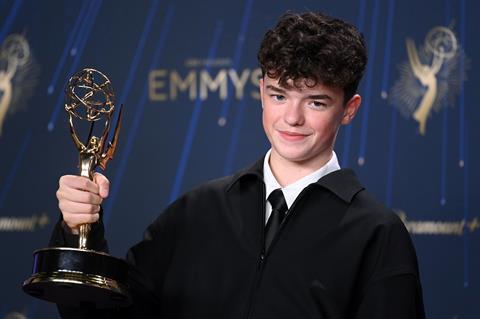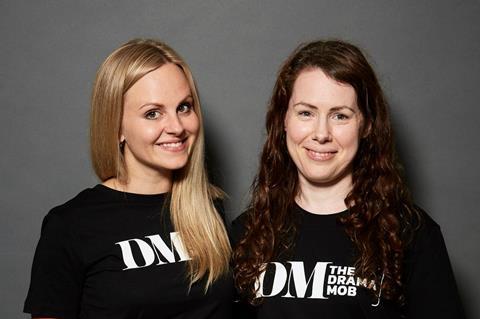Actor Owen Cooper’s Emmy success has shone a light on how the UK’s regional drama schools are nurturing young working-class talents — and the challenges they face in a London-centric industry.

When the 15-year-old Adolescence star Owen Cooper won the Primetime Emmy for best supporting actor this year, his success was celebrated by Manchester-based drama school and casting agency The Drama Mob, where Cooper had trained for two years prior to bagging the role.
“When I started these drama classes a couple of years [ago], I didn’t expect to be in the United States, let alone here,” Cooper said on stage, as he became the youngest male to ever win an acting award at the Primetime Emmys.
It was the team at The Drama Mob who first signed up Cooper to the casting directory Spotlight, taught him audition technique and put him forward for the Adolescence role when contacted by casting director Shaheen Baig. “He did a fantastic job on his own but there was a lot of work in the background to get him to that point,” says The Drama Mob founder Esther Morgan. “It was clear as soon as he came to us that he was talented. But he came with a completely blank CV, and we trained him for two years.”

The Drama Mob, which was co-founded by actress Tina O’Brien, is one of many regional acting schools outside London that are growing and nurturing young, often working-class, acting talent. Like Mob, Nottingham and Sheffield-based school Inspire Academy also has its own casting agency with clients whose credits include roles in Sherwood, How To Have Sex and the upcoming second series of Rivals.
“The natural progression is to set up an agency because we know our young people, we know what they’re right for,” says Inspire Academy’s executive director Luke Gell. It also allows the organisations to funnel money back into the school to keep down the cost of membership fees.
Inspire relies entirely on agency commissions and membership fees — the latter of which cost £40 ($53) a month with 15% of places offered as scholarships and bursaries. But being based outside of London can be an uphill battle. “I’ll have ‘London-based’ or ‘within the M25’ written on my gravestone because I just see it all the time [on casting notices],” says Gell, with a laugh.
Even when castings do go nationwide, recalls can still be in London where young actors are often expected to carry the weight of travel costs. Stacey Burrows, who heads Yorkshire agency and drama school Articulate, says she drives children to London herself when their parents and caregivers cannot afford the transport.
“Some of our working-class actors get pushed out when it comes to recall stages because they can’t get [to London],” says Burrows, whose clients took on several key supporting roles in Adolescence. She acknowledges productions’ own budget constraints are often to blame for a lack of travel expenses but fears “it just makes it even harder for working-class people to break through”.
The Drama Mob’s Morgan points to the casting directory Spotlight, which raised its yearly subscription to £205.80 ($270) in 2024 (£134.70/$178 for those under 18) — a standard fee regardless of where the actor is based in the UK. “It’s something we challenge on a regular basis because our children are paying the same amount as anyone else to be on Spotlight,” says Morgan, who estimates 80% of callouts posted are exclusively London-based.
UK actors’ union Equity had been embroiled in a long-running legal battle with Spotlight to justify its fees and be recognised as an employment agency, but the case was dismissed in September. “I do agree they’re not an employment agency,” adds Burrows of Spotlight. “But it would be nice to see a cap on [fees] for [actors] outside of London because most of the opportunities on there are for London-based kids.”
Local talent
Baig’s work on the Yorkshire-shot Adolescence earned her a Primetime Emmy and she is one of the casting directors who works regularly with children and young actors from outside the London bubble. Known for her street casting, Baig often scouts local talent in schools, youth theatres and extra-curricular clubs. “I always tend to send callouts into the system, to agents, but then often I will send it out in a wider sense,” she says.
Baig suggests self-taping, which has grown in popularity since the pandemic, has helped to level the playing field. “Even though I don’t love self-taping, it has been a good thing,” she says. “I would much rather an actor put themselves on tape, or I do a Zoom with them, than pay £150 [$200] to get a train to London. That is absurd.”
It also helps that more productions are being made regionally, though many would argue it is still not enough. “I’d love to see more things being made in the north,” says Morgan. “We’ve got some of the quickest councils that will licence children [for work] a lot quicker than London councils.”

With drama as a school subject on the decline in England, nurturing talent outside of London may prove to be even harder, particularly for those from working-class and disadvantaged backgrounds. Burrows says Articulate contacted more than 60 schools across Yorkshire at the start of September to offer free drama and screen acting workshops, but received only five responses.
“Schools are crying out for more funding for the arts and to be able to give kids accessibility to the arts, so we’re shocked to get this kind of response,” says Burrows, acknowledging workloads, resources and the logistics may also play a part in the lack of uptake.
In Scotland, film and screen are set to become part of the national curriculum with pupils aged from three to 18 given the opportunity to study it as a practical arts subject. Baig would love to see the approach rolled out across the UK. “The industry makes a lot of money for this country so it should be integrated into secondary education in some way,” she says. “It would make a world of difference to the representation we have in the industry. It would open it right up.”
In the short term, the success of Adolescence has given optimism to the regional schools and agencies. Morgan says there was a clear uptake in students joining The Drama Mob after the series premiered on Netflix in March, while Gell has seen an increase in boys in particular trying out acting.
“I can’t think of a time that’s ever happened in a drama workshop,” he notes. “Without even knowing it, Owen Cooper has become a bit of a role model to young people.”

























No comments yet